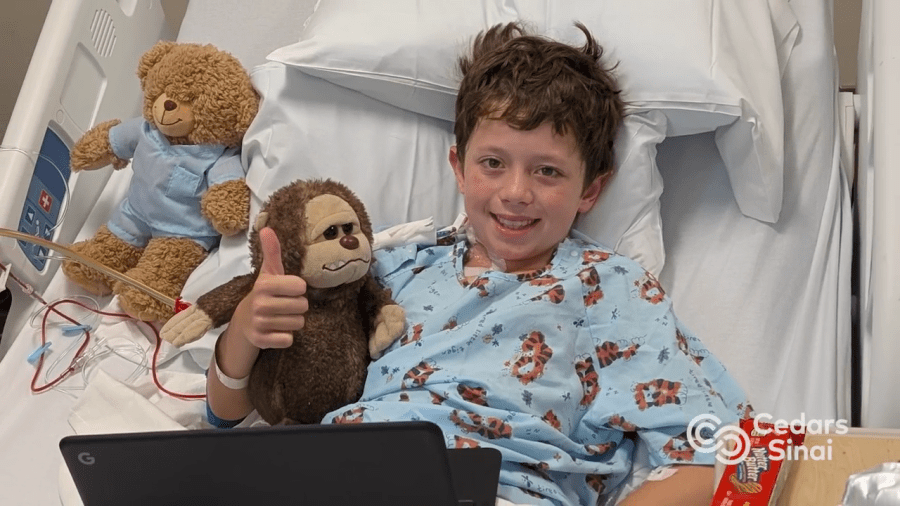A Los Angeles boy is being credited with saving the life of his father by donating stem cells to help treat his dad’s leukemia.
Just nine years old at the time, Stephen Mondek is the youngest person in the history of Cedars-Sinai to donate their stem cells, officials said. It was done in hopes of helping to kickstart a new immune system for his father, whose been battling the deadly blood cancer for several years.

Dr. Nick Mondek, an anesthesiologist in the Los Angeles area, was diagnosed with acute myeloid leukemia in 2022. He received a successful stem cell transplant from his younger brother which led to his cancer going into remission.
But earlier this year, his cancer returned. He would need a new transplant, and his brother would not be eligible to donate this time around.
“We followed every clinical protocol but the disease still managed to come back, so we had a new problem on our hands,” said Dr. Ronald Paquette, clinical director of the Stem Cell and Bone Marrow Transplant Program at Cedars-Sinai Cancer. “How could we treat his cancer a second time around and have a better chance that it doesn’t return?”
Mondek’s care team looked for relatives and searched the National Bone Marrow Registry for a potential donor but came up empty. Eventually, Nick Mondek remembered that a close friend suffering from lymphoma had received a donation from his 18-year-old son.
That got him thinking: how young could a donor be?
Paquette confirmed that there was a chance it could work. Stephen shares half his DNA with his father, and if his immune system would be compatible, that half-match might actually benefit him.
Because of the way our bodies’ immune systems work, a half-match might be able to recognize and kill cancer cells more effectively in Mondek’s bone marrow. Nick’s brother, who previously donated, was a perfect genetic match, but Stephen might actually have been a better candidate in the long run.
“The conversation with Stephen was pretty simple,” Mondek said. “I said, ‘Hey, Buddy, Dad’s sick and they need someone to give me stem cells, and they want to know if you want to get tested to see if you can do it.’”
Stephen didn’t hesitate. “When do we go?” he asked.
Eventually, several weeks after testing, blood work, shots and important conversations, the father-son duo arrived at Cedars. In what hospital staff described as a “high-risk procedure,” Stephen spent several hours in the pediatric intensive care unit with a catheter inserted into a vein in his neck.
His stem cells were separated from his blood and frozen, and Stephen and his dad, mom and younger brother returned to their Torrance home for the night.
A week later, Nick Mondek was admitted for a six-day stay in which he received chemotherapy to suppress his immune system so that his body wouldn’t reject the donation. Then the transplant took place.

“Transplant day is always dramatic,” Paquette told the media team at Cedars-Sinai. “The patient knows that they cannot survive without the stem cells, and the delivery of the stem cells into their body is like a rebirth. We call that day their stem cell birthday.”
Nick remained in the hospital for two more weeks as hospital staff monitored the newly transplanted stem cells to ensure they would grow and begin the process of rebuilding his immune system. During that time, he could not see his family in person due to the delicate nature of his health.
On Aug. 16, Dr. Nick Mondek and his new immune system were discharged from Cedars and returned home.
“Everything lined up for this,” Mondek said. “Dr. Paquette said the perfect donor for me would be someone who’s young and healthy and a 50% match, and we found him. He was right here in front of us.”
While he’s not out of the woods yet, it’ll still take a year or more to determine if the new immune system can beat back Nick’s leukemia.
Dr. Paquette says he’s optimistic about Mondek’s prognosis. “Most of the time, it’s a cure. Most of the time a transplant is a cure. That’s why we love transplants,” he said.
The family shares in that optimism, and Stephen, who turned 10 last month, has no regrets.
“I felt good helping my dad,” Stephen said, “and it felt good to have him home.”
For more information on this story, click here.


